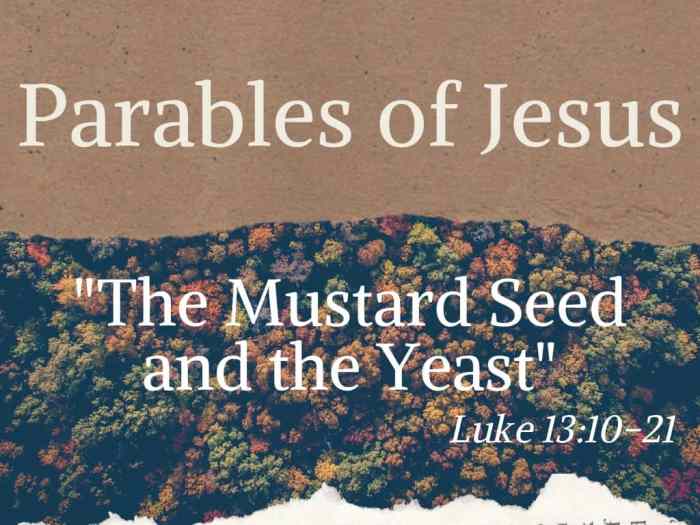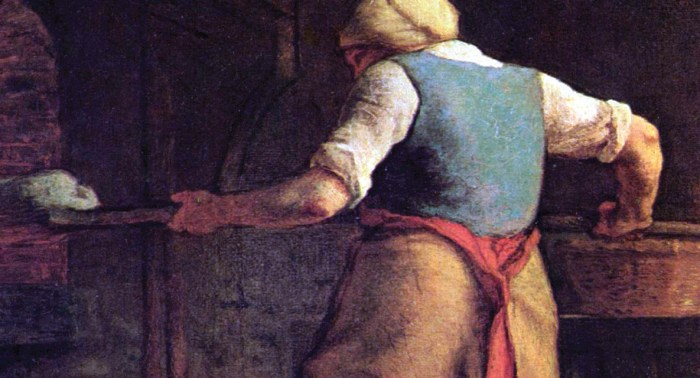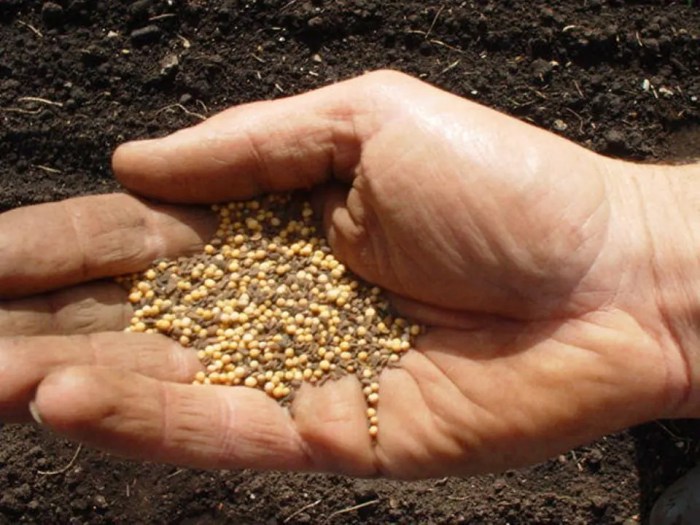The Parables of the Mustard Seed and the Yeast, found within the Gospels, stand as enigmatic tales that have captivated and inspired generations. Through the lens of these parables, Jesus unveils profound truths about the nature of faith, the growth of God’s Kingdom, and the transformative power of trust.
These parables, seemingly simple in their imagery, carry within them a depth of spiritual wisdom that continues to resonate with believers today. By examining their symbolism, intended audience, and practical applications, we embark on a journey to uncover the timeless truths they hold.
Parables of the Mustard Seed and the Yeast

The parables of the mustard seed and the yeast are two of the most well-known and beloved parables of Jesus. They are both found in the Gospel of Matthew, and they both teach important lessons about the nature of the Kingdom of God.
Biblical Context
The parable of the mustard seed is found in Matthew 13:31-32, while the parable of the yeast is found in Matthew 13:33. Both parables were spoken by Jesus to a crowd of people who had gathered to hear him teach.
The intended audience was the general public, and the purpose of the parables was to teach them about the nature of the Kingdom of God.
Symbolism and Meaning
The mustard seed is a tiny seed, but it has the potential to grow into a large tree. In the parable, Jesus uses the mustard seed to represent the Kingdom of God. He teaches that the Kingdom of God starts small, but it has the potential to grow into something great.
The yeast is a small amount of leaven that can cause a large amount of dough to rise. In the parable, Jesus uses the yeast to represent the Holy Spirit. He teaches that the Holy Spirit can work in our lives to transform us and make us more like Christ.
Kingdom of God, Parables of the mustard seed and the yeast
The parables of the mustard seed and the yeast both illustrate the nature and growth of the Kingdom of God. They teach that the Kingdom of God starts small, but it has the potential to grow into something great. They also teach that the Holy Spirit is essential for the growth of the Kingdom of God.
The Kingdom of God is not a physical place, but it is a spiritual reality that is present in the hearts of believers. The Kingdom of God is a realm of love, joy, peace, and righteousness. It is a kingdom that is not of this world, but it is a kingdom that is coming.
Faith and Trust
The parables of the mustard seed and the yeast both encourage faith and trust in God. They teach that even though the Kingdom of God may start small, it has the potential to grow into something great. They also teach that the Holy Spirit is present in our lives to help us grow in faith and trust.
The parables of the mustard seed and the yeast are a reminder that we should not be discouraged by the small beginnings of the Kingdom of God. We should have faith and trust that God will cause it to grow into something great.
Practical Applications
The lessons from the parables of the mustard seed and the yeast can be applied to our personal lives in many ways. They can teach us to be patient and to trust in God’s timing. They can also teach us to be bold and to take risks for the sake of the Kingdom of God.
Here are some specific examples of how the lessons from the parables of the mustard seed and the yeast can be applied to our personal lives:
- We can be patient and trust in God’s timing when we are going through difficult times.
- We can be bold and take risks for the sake of the Kingdom of God, even when we are afraid.
- We can use our gifts and talents to serve others and to build up the Kingdom of God.
- We can be a light to the world and show others what the Kingdom of God is like.
The parables of the mustard seed and the yeast are a reminder that we are all part of the Kingdom of God. We are all called to be a part of its growth and expansion. Let us be faithful to our calling and let us trust in God’s power to do great things through us.
Detailed FAQs
What is the significance of the mustard seed in the parable?
The mustard seed, though tiny in size, represents the potential for immense growth and impact. It symbolizes the humble beginnings of God’s Kingdom, which, despite its unassuming start, would expand and flourish.
How does the parable of the yeast illustrate the transformative power of faith?
The yeast, a small but potent agent, represents the transformative power of faith. Just as a small amount of yeast can leaven an entire loaf of bread, so too can faith, even in its smallest form, bring about profound change and growth in our lives.


